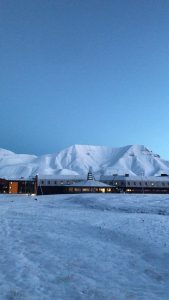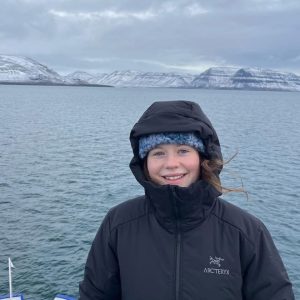
Marianne Williams-Kerslake is a PhD student at the Nansen Center looking at marine heatwaves in the Arctic Ocean. Marine heatwaves are periods of extreme high sea surface temperatures relative to long-term trends. The annual intensity, frequency (number of events per year), and duration of marine heatwaves have increased in the Arctic Ocean in recent decades. In particular, a high frequency of marine heatwaves has been observed around the Svalbard archipelago, leading Marianne to focus on this area. Marianne has been using TOPAZ, a physical reanalysis for the Arctic Ocean, to characterise marine heatwaves around Svalbard. In the autumn of 2024, supported by the Bjerknes Climate Prediction Unit, she travelled to The University Centre in Svalbard (UNIS) for 2.5 months. She was there to validate and compare marine heatwaves in TOPAZ to observations (measurements) that have been gathered from multiple moorings around Svalbard. This is an exciting opportunity and will enable us to determine how effectively TOPAZ can capture marine heatwave events in this region.
Using observations to assess the effectiveness of the TOPAZ model in portraying marine heatwave events contributes to the research aims of the Bjerknes Climate Prediction Unit, particularly, RA3 – assessing the limits of climate prediction. We will be able to quantify the impact of model errors/limitations on TOPAZ projections of marine heatwaves, increasing our understanding of systems such as TOPAZ.

“Working at UNIS and experiencing life and the nature in Svalbard was an amazing experience. I worked in the Arctic Geophysics group and was supervised by Ragnheid Skogseth and Frank Nilsen. It was fascinating and inspiring to learn about the wide range of research going on at UNIS; in the Arctic Geophysics group alone, there were a variety of projects from Aurora research and polar space missions to essential climate monitoring. During my visit, I obtained encouraging results regarding the accuracy of TOPAZ’s performance in the Svalbard region. I am now in the process of writing up these findings for my first paper. I hope to return to Svalbard for the later studies in my PhD and continue collaboration between the Bjerknes Center and UNIS.” – Marianne Williams-Kerslake



